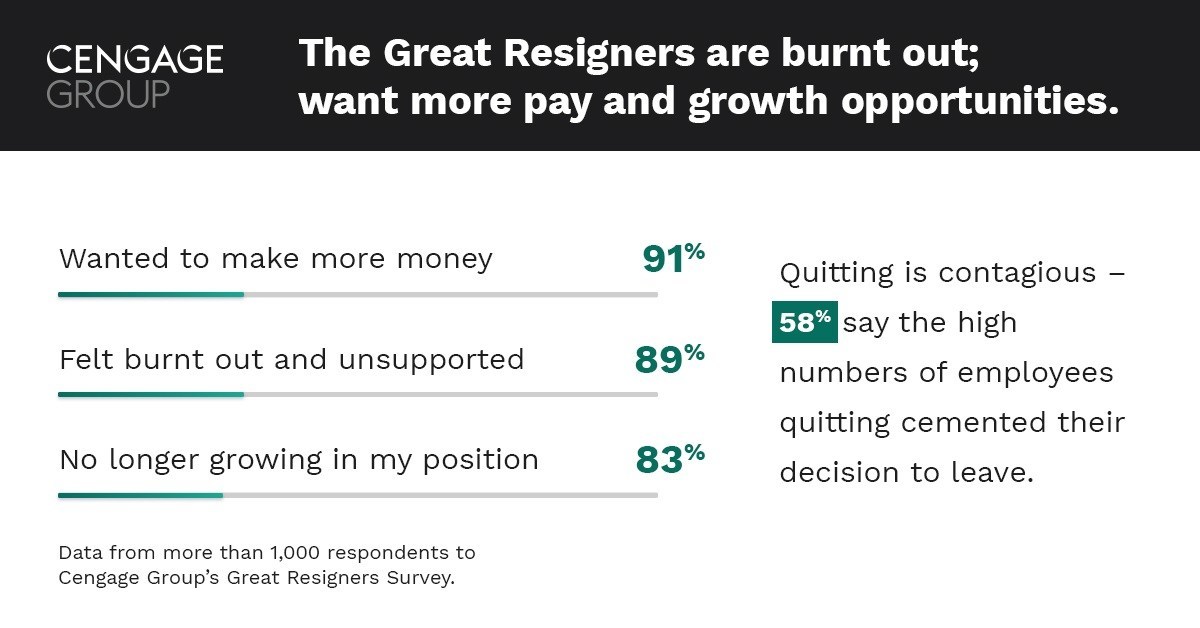Employee resignations are at an all-time high in the U.S. as nearly 40 million workers resigned from their positions during 2021 as part of “The Great Resignation.” Resigners are evaluating their priorities, and choosing to walk away from their jobs in search of better pay, relief from burn out, and looking to combat stagnant careers. Many resigners are willing to be out of work while they look for a new position, and they see online training courses giving them an advantage in the job search process, according to research from Cengage Group.

“The research is clear: while the pandemic has caused stress and grief for millions, at the same time, the disruption of the past two years provided space for workers to evaluate and assess their priorities and their options. Millions of workers are changing how they think about work, their purpose and the impact of their careers,” said Michael E. Hansen, CEO, Cengage Group.
Cengage Group surveyed 1,200 U.S. adults across industries who had either quit their jobs in the last six months or are seriously planning to quit their jobs in the next six months. The results are presented in a new report – From The Great Resignation to the Great Reskilling: Insight on What’s Next for the Great Resigners.
Here are some of the key survey findings:
- Workers are burnt out and want more pay. They are willing to make personal sacrifices to get a new lease on their professional lives. In fact, 71% said they had to or would have to be out of work in between jobs.
- Online training is a stepping stone to resigners’ next opportunities, and their sights are set on three industries. Nearly 4 out of 5 resigners (78%) have completed or were currently enrolled in an online training course or certificate program at the time of the survey. And their motivations are clear: 64% say that having an online training program on their resume is essential to landing a new job.
- The most popular industries to reskill or upskill into are:
- Finance & Insurance (24%)
- Technology (24%)
- Healthcare (20%)
- The most popular industries to reskill or upskill into are:
- Employers must prioritize professional development and benefits or risk more employee resignations. Many resigners left their jobs in part because of a lack of professional development opportunities and feeling like they were no longer growing in their positions. Not surprisingly, the most important attributes of resigners’ next roles are good benefits (33%), better pay (23%), but also clear opportunities for professional growth (22%).
- Quitting is contagious. More than half of resigners (58%) said that the high number of employees quitting cemented their decision to leave, too.
Hansen continued, “Our growing Workforce Skills business has had a front-row seat to these shifts in the workforce, helping adults access upskilling and reskilling opportunities in order to secure meaningful jobs that provide opportunities for better pay, accommodating schedules and career growth. At the same time companies are struggling to find and retain qualified workers.
“As millions reconsider what is important to them – in life and in their next job – there is an opportunity for employers to reconsider how they support employees’ well-being and professional growth, both to recruit new talent and retain existing employees. As the CEO of a global company, I’m acutely aware of the opportunity we have to evaluate our hiring practices and expand learning and development opportunities for employees.”
You can download the full report here.
Want to read more site selection-related surveys and research?
Check out all the latest surveys and research regarding economic development, corporate relocation, corporate expansion and site selection.
















![[VIDEO] Get More for Your Business in Ardmore. Oklahoma](https://businessfacilities.com/wp-content/uploads/2024/02/maxresdefault-324x160.jpg)
